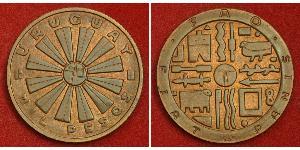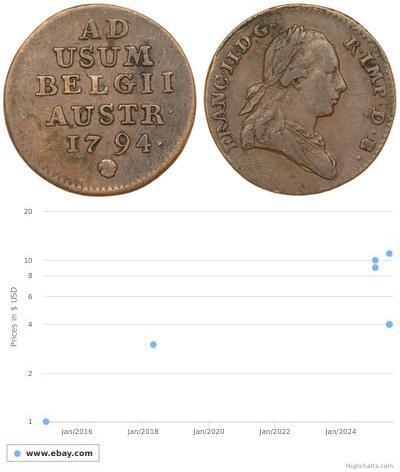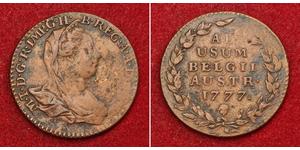2000 Peso Uruguay Silver
1983, Uruguay (Republic). Large Proof Silver 2000 Nuevo Pesos Coin
Mint Year: 1983 Condition: Lightly toned proof! Denomination: 2000 New Pesos - Spanish royal visit to Uruguay, during 1983. Material: Silver (.900) Diameter: 50mm Weight: 65gm
Obverse: Conjoined busts of the King and Queen of Spain left. Legend: VISITA DE LOS REYES DE ESPANA A LA R.O. DEL URUGUAY . MAYO 1983 .
Reverse: Coat-of-arms of Uruguay and Spain above value (N$ 2.000).
In May 1983, Spanish King Juan Carlos I paid an official visit to Uruguay. During his visit, the King met with the leaders of the Civic-military dictatorship of Uruguay to discuss a possible transition to democracy in the country. The King would return to Uruguay in November 1996 and once more in November 2006 to attend the 16th Ibero-American Summit being held in Montevideo.
Uruguay (Uruguai), officially the Oriental Republic of Uruguay, is a country in South America. It shares borders with Argentina to its west and southwest and Brazil to its north and northeast; while bordering the Río de la Plata to the south and the Atlantic Ocean to the southeast. Uruguay covers an area of approximately 176,000 square kilometers (68,000 sq mi) and has a population of an estimated 3.51 million, of whom 2 million live in the metropolitan area of its capital and largest city, Montevideo.
The area that became Uruguay was first inhabited by groups of hunter–gatherers 13,000 years ago. The predominant tribe at the moment of the arrival of Europeans was the Charrúa people, when the Portuguese first established Colónia do Sacramento in 1680; Uruguay was colonized by Europeans late relative to neighboring countries. The Spanish founded Montevideo as a military stronghold in the early 18th century because of the competing claims over the region. Uruguay won its independence between 1811 and 1828, following a four-way struggle between Portugal and Spain, and later Argentina and Brazil. It remained subject to foreign influence and intervention throughout the 19th century, with the military playing a recurring role in domestic politics. A series of economic crises put an end to a democratic period that had begun in the early 20th century, culminating in a 1973 coup, which established a civic-military dictatorship. The military government persecuted leftists, socialists, and political opponents, resulting in several deaths and numerous instances of torture by the military; the military relinquished power to a civilian government in 1985. Uruguay is today a democratic constitutional republic, with a president who serves as both head of state and head of government.
(1977 X 944 pixels, file size: ~346K)
Posted by: anonymous 2021-12-01
1983, Uruguay (Republic). Large Proof Silver 2000 Nuevo Pesos Coin. 65gm! Mint Year: 1983 Condition: Lightly toned proof! Denomination: 2000 New Pesos - Spanish royal visit to Uruguay, during 1983. Material: Silver (.900) Diameter: 50mm Weight: 65gm Obverse: Conjoined busts of the King ...
(1125 X 420 pixels, file size: ~75K)
Posted by: anonymous 2017-10-04
URUGUAY 1983 2000 Pesos Royal Visit Large Silver Choice Proof
2 Liard Austrian Netherlands (1713-1795) Copper
group has 3 coins / 3 prices
⇑









-300-150-zTgKbzbixN4AAAFSpQBzJO3T.jpg)






